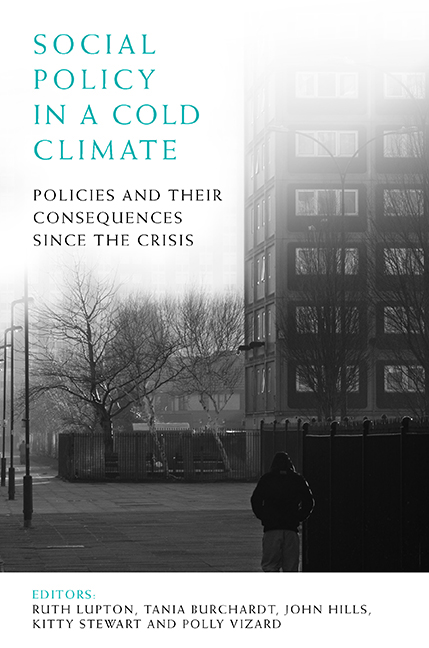Fourteen - Summary and conclusion
Published online by Cambridge University Press: 01 September 2022
Summary
In this book, we set out to describe how different parts of social policy in the UK have changed in the eight years from the beginning of the economic crisis in 2007 up to the end of the Liberal Democrat- Conservative coalition government in May 2015. We have also looked at what is known so far about outcomes from those policies and changes in them, although given lags in both the effects of many policies and reforms, and in data that allow one to assess them, this must inevitably remain an interim assessment.
Given the scale of the economic shock – unprecedented since the 1930s – and the effect it had on public finances, and then the change in government priorities after Labour lost office in 2010, this was, indeed, as suggested in the Introduction (see Chapter One), an era with a ‘cold climate’ for many areas of social policy. As the contrasts between the chapters show, however, this has been by no means a uniform history. There were some strong contrasts between the policies Labour continued to pursue until it lost office in May 2010, and those of its successors (although there were also continuities). But as we have documented, there were sharp differences between social policy areas under the coalition, especially in how severely each was asked to contribute to that government's plans for reducing the public budget deficit. There were some areas that were comparatively insulated, although still affected by major reform, while in others the role of the state has been redrawn or even substantially withdrawn. Writing early in the life of a new majority Conservative government, much of this conscious reshaping of Britain's welfare state is set to be continued or intensified.
Social policy in a warmer climate
In an earlier book (see Hills et al, 2009), we surveyed what had happened to a comparable range of policies in the period of Labour government ending as the economic crisis began. We concluded that the picture was neither that a government with a strong parliamentary majority, egalitarian objectives and a favourable economy had decisively reversed the gaps in society that had widened over the previous two decades, but nor was there a simple pattern of the betrayal of those egalitarian ideals.
- Type
- Chapter
- Information
- Social Policy in a Cold ClimatePolicies and their Consequences since the Crisis, pp. 319 - 342Publisher: Bristol University PressPrint publication year: 2016

